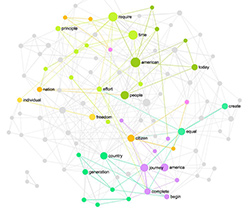Posted by Nodus Labs | July 11, 2012
Eroding the Boundaries of Cognition

The new paper Eroding the Boundaries of Cognition: Implications of Embodiment published in the latest issue of Topics in Cognitive Science provides an interesting overview of the current state of embodied cognition science (ECS). The main tenet of ECS is that cognition extends beyond the brain into the body and further into the environment. ECS also shifted away from viewing the brain as having a modular structure where each region is responsible for a certain activity.
Instead, it proposes that brain networks are based on so-called soft assembly, where structural constellations of neurons are responsible for performing several tasks that may be different from each other. In other words, it’s the relationship between components (within the brain, the brain-body and body-environment systems) that produces complex behaviors, enabling us to perform perception and cognition tasks as well as to act.
One interesting example taken from a previous study presented in this paper describes how social cognition works in large groups of people:
The recent work of Roberts and Goldstone (2009) examining the mechanisms by which a group of individuals coordinate their behavior to complete a ‘‘Binary Search’’ task provides a more traditionally cognitive example of how social systems are softly assembled and exhibit interaction-dominant dynamics (see also Theiner, Allen, & Goldtsone, 2010 for a detailed description of this work). In this research study, internet-connected individuals played a game in which they were told that a computer would randomly generate a target number between 51 and 100 and that their job was to guess (as a group) what the target number was over a series of ‘‘guessing’’ rounds. For each round, participants were
instructed to enter a number between 0 and 50. The group’s responses were then summed and compared to the target number. Participants were then given feedback about whether the collective response was too high or too low. This guess-then-feedback process was repeated until the group successfully arrived at the target number. Not surprisingly, groups were able to perform the task successfully and improved over time (groups took fewer rounds to reach the target number as the number of games played increased). Members of a group spontaneously differentiated, with some members adopting the role of reactors (i.e., always increased or decreased their guess on a subsequent round), while other members adopted the role of non-reactors. That is, over time the variability of reactivity for the individual group members decreased (individual group members reacted more consistently), while the variability of reactivity across group members increased (the diversity of reactive strategies increased). Equally important was that the spontaneous differentiation of group members was found to be related to the overall performance of the group—the degree of reactive diversity was positively correlated with task performance.
The cognitive success of the group was, therefore, not reducible to any one individual group member, nor was it the result of the steady-state dynamics of the constituent individuals, but rather it was an emergent capacity that arose from the interactions among the individual group members. Successful groups converged onto a globally stable pattern of behavior,
whereby the stability of this behavioral pattern was dependent on a specific organization of the component individuals, not the individuals themselves. The same individuals, at a different time and given a different set of initial conditions or responses, could (and most likely would) have evolved a different pattern of reactive strategies and yet achieve the same level of group success (Roberts & Goldstone, 2009; Theiner et al., 2010). Hence, the cognitive system was a functional grouping of individuals that were temporarily constrained to act as a single coherent unit or synergy, one that was softly assembled and exhibited interactiondominant dynamics. The group itself exhibited cognition.
quoted from Eroding the Boundaries of Cognition.

